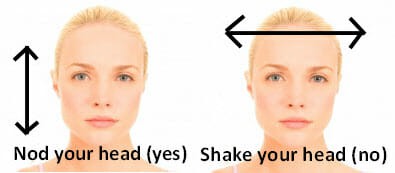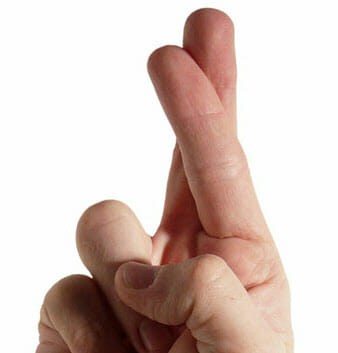
When you put your shoulders up to say “I don’t know”… is that called lifting, raising, or shrugging your shoulders?
When you move your head up and down to say “yes,” is that called bowing, nodding, or shaking your head?
You’ll learn the answers to these in today’s lesson about verb + body part collocations!
Collocations are common combinations of words that go together naturally in a language, and you can learn lots more of them inside 1000 English Collocations in 10 Minutes a Day!
nod your head / shake your head

Move your head up and down to say yes, or side to side to say no
When you nod your head, you move your head up and down. This means “yes” or “I agree/approve.”
When you shake your head, you move your head from side to side. This means “no” or “I disagree/disapprove.”
The verb “nod” can be used alone, but not “shake.”
- I asked my boss if he liked my idea, and he nodded. “I think it’s great!” he said.
- I asked my boss if he liked my idea, and he shook his head. “I don’t think it’ll work,” he said.
turn your head

When you turn your head, you direct it to one side.
To turn your head is to direct it to one side.
We can also say “turn towards” when the person turns to look at something, and “turn away” when the person turns in the opposite direction.
- “Sarah turned towards me when I called her name.”
- “I asked her why she was so angry, but she turned away and wouldn’t look at me.”
hang your head / bow your head
When someone is ashamed, they might hang their head by putting their chin down and looking downwards. The expression “hang your head” is only used for doing it with the feeling of shame. But if we do the same movement to pray or show respect, that’s called “bowing your head.”
roll your eyes

You can “roll your eyes” when you are annoyed
If you roll your eyes, it is often when you are annoyed, when you want to be sarcastic, or when you think something is stupid. Be careful with this gesture, because it can be impolite.
- The teacher rolled her eyes when the class asked for the tenth time what page the homework was on.
blink your eyes / wink

This is “winking”
You wink when you close only one eye and quickly open it again. This means something is funny or cute. Sometimes people also use it when they are romantically interested in another person.
You blink when you close BOTH eyes and quickly open them again. This gesture doesn’t have any particular meaning, because we do it constantly!
raise an eyebrow / raise your eyebrows

You “raise an eyebrow” when you are curious or suspicious
When you raise an eyebrow (only one eyebrow) it means you are curious, suspicious, or skeptical of something.
When you raise your eyebrows (two eyebrows), it usually means that you’re surprised:

blow your nose / pick your nose

When you blow your nose, you clean out the contents of your nose into a tissue or handkerchief. Try not to do this in public!
It’s also considered rude and gross to pick your nose – put a finger in there to get the mucus out. Children often do this.
stick out your tongue

Children often stick out their tongues to be silly or to tease another child. Depending on the attitude of the person doing it, it can also be rude.
cover your mouth / wipe your mouth
We also teach children to cover their mouths when they cough or sneeze, and to wipe their mouths with a napkin when there’s food or drink on them.
clear your throat
Clearing your throat is a sound. Many people try to clear their throat when they are sick. But it can be also used in social situations to get someone’s attention.

shrug your shoulders

Shrug your shoulders to say “I don’t know.”
You can shrug your shoulders to say “I don’t know,” “I don’t care,” or “It’s not important.” The verb shrug can also be used alone:
- I asked him which movie he wanted to see, and he shrugged. “It’s your decision,” he said.
cross your legs

Two ways to “cross your legs”
“Crossing your legs” doesn’t have any particular meaning – it is just a way to sit.
cross your arms

Crossing your arms can show anger
In some cases, “crossing your arms” can be neutral – but it’s also possible to cross your arms to show that you are angry, so it’s good to avoid this position in social situations.
keep your fingers crossed
“Keeping your fingers crossed” has a special meaning in English – it means to hope for good luck or a positive result:
- “On Wednesday I’ll find out if I passed the English test.”
“Oh, really? Do you think you did?”
“Well, the test was difficult, so I’m not sure… keep your fingers crossed!”
give the finger
“Giving the finger” is an extremely rude gesture. Some other idioms for this gesture are “flip off” and “flip the bird.”
give a thumbs up / thumbs down

Use this gesture to approve or disapprove
If you give a thumbs up, it means you approve of something or think it’s great:
If you give a thumbs down, it means you disapprove of something or think it’s terrible.




